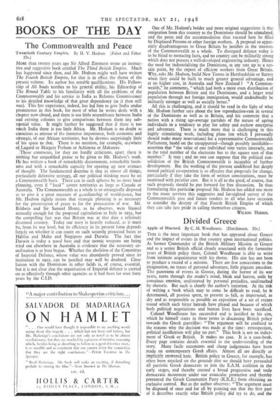BOOKS OF THE DAY
The Commonwealth and Peace
MORE than twenty years ago Sir Alfred Zimmern wrote an instruc- tive and suggestive book entitled The Third British Empire. Much has happened since then, and Mr. Hodson might well have written The Fourth British Empire, for that is in effect the theme of the present volume. Its author has notable qualifications. His Fellow- ship of All Souls testifies to his general ability, his Editorship of The Round Table to his familiarity with all the problems of the Commonwealth and his service in India as Reforms Commissioner to his detailed knowledge of that great dependency (as it then still was). This last experience, indeed, has led him to give India undue prominence in this book, for most of what he writes deals with a chapter now closed, and there is too little resemblance between India and existing colonies to give comparisons between them any sub- squitial value. It might further be suggested that if there is too much India there is too little Africa. Mr. Hodson is no doubt as *scions as anyone of the immense importance, both economic and stitategic, of our African territories, but he devotes surprisingly little of his space to that. There is no mention, for example, anywhere oil Lugard or Margery Perham or Achimota or Makerere.
;Those comments, for they are hardly criticisms, apart, there is nothing but unqualified praise to be given to Mr. Hodson's work. He has written a book of remarkable discernment, remarkable fresh- ntss and with a remarkable capacity for opening up new avenues of thought. The fundamental doctrine is that in almost all things, particularly defensive strategy, all our political thinking must be on a Commonwealth basis. There can in such spheres be no more local planning, even if "local " covers territories as large as Canada or Australia. The Commonwealth as a whole is so strategically disposed as to give it a great measure of guardianship of world-peace, but Mr. Hodson rightly insists that strategic planning is as necessary for the preservation of peace as for the prosecution of war. Mr. Baldwin and Sir Samuel Hoare, as he observes, were blamed naturally enough for the proposed capitulation to Italy in 1935, but the compelling fact was that Britain was at that date a relatively disarmed country. Today our navy is heavily reduced, as it-must be, from its war level, but its efficiency in its present form depends largely on whether it can count on such securely protected bases as Halifax and Malta and Singapore and Darwin. The fact that Darwin is today a naval base and that atomic weapons are being tried out elsewhere in Australia is evidence that the necessary co- ordination is at least begun. Whether the abolition of the Committee of Imperial Defence, whose value was abundantly proved since its institution in 1902, can be justified may well be doubted. Close liaison with the Dominions in other fields is, of course, essential, but it is not clear that the organisation of Imperial. defence is carried on as effectively through other agencies as it had been for over forty. years by the C.I.D. One of Mr. Hodson's bolder and more original suggestions is that emigration from this country to the Dominions should be stimulated, and the posts and the accommodation thus vacated here be filled by Displaced Persons or other foreign workers. A proposal so appar- ently disadvantageous to Great Britain he justifies in the interests of the Commonwealth as a whole. To disregard defence today is to be blind to menacing facts, and no country can be militarily strong which does not possess a well-developed engineering industry. Hence the need for industrialising the Dominions, at any rate up to a cer- tain point, by the export of efficient workers from Great Britain. Why, asks Mr. Hodson, build New Towns in Hertfordshire or Surrey when they could be built to much greater general advantage, and at no higher cost, in Australia and New Zealand ? " A Common- wealth," he comments, " which had both a more even distribution of population between ,Britain and the Dominions, and a larger total population through net foreign immigration, would undoubtedly be militarily stronger as well as socially better."
All this is challenging, and it should be read in the light of what Mr. Hodson further says about the low reproduction-rate in several of the Dominions as well as in Britain, and his comment that a nation with a rising age-average partakes of the nature of ageing individuals in a tendency to play for safety and eschew enterprise and adventure. There is much more that is challenging in this highly stimulating work, including plans (on which I personally should make many reservations) for a representative Commonwealth Parliament, based on the unsupported—though possibly justifiable— assertion that " the value of one individual vote varies inversely, not to the total number of the electorate but to the square root of that number." It may ; and no one can suppose that the political con- solidation of the British Commonwealth is incapable of further development. But the working of the present undefined but deeply rooted political co-operation is so effective that proposals for change, particularly if they take the form of written constitutions, must be examined with peculiar care. But it is all to the good, of course, that such proposals should be put forward for free discussion. In thus formulating this particular proposal Mr. Hodson has added one more to the many services this suggestive and far-sighted survey of the Commonwealth past and future renders to all who have occasion to consider the destiny of that Fourth British Empire of which they can take just pride in calling themselves citizens.
WILSON HARRIS.


































 Previous page
Previous page